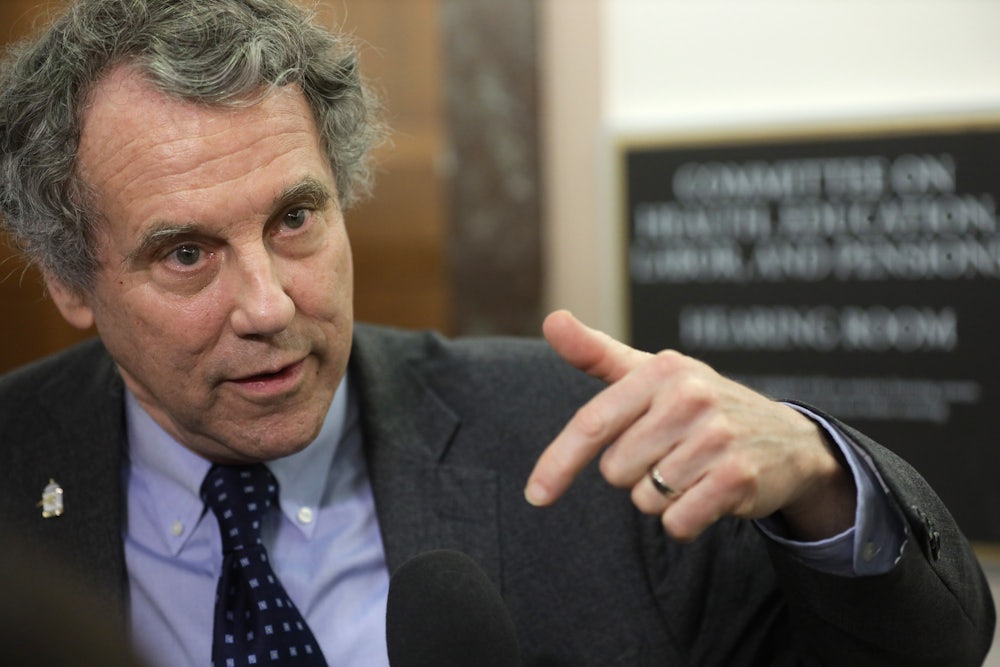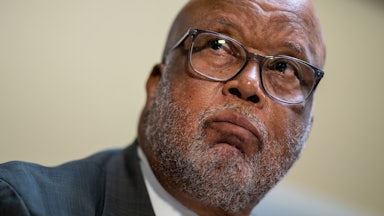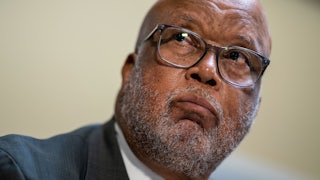President Joe Biden is having a tough time getting some of his nominees confirmed. On Tuesday, three Democrats voted alongside all Republicans to sink the nomination of David Weil to lead the Labor Department’s Wage and Hour Division.
But several of Biden’s nominees to the Federal Reserve have faced particular hurdles. The committee overseeing the nominations deadlocked on the nomination of Lisa Cook to the Federal Reserve Board, meaning that the full Senate had to vote this week to “discharge” her nomination to be considered on the Senate floor. One of Biden’s picks to serve on the board, Sarah Bloom Raskin, withdrew her nomination amid sustained opposition from all Republicans and one Democrat, Senator Joe Manchin. Republicans had withheld a committee quorum, preventing consideration of any of Biden’s nominees to the Fed, although they relented after Raskin withdrew her nomination.
Senator Sherrod Brown, the chair of the Senate Committee on Banking, Housing and Urban Affairs, which oversees nominees to the Federal Reserve, identified a “pattern” in Republican opposition to several of Biden’s picks.
“I don’t want to say they’ll never vote for women of color, but there’s certainly quite a pattern where they gang up on, vote against, try to undermine prominent women of color,” Brown said in an interview with The New Republic. The Ohio Democrat pointed to Republican opposition to Saule Omarova, who withdrew her nomination to become one of the country’s top banking regulators last year; Sandra Thompson, whose nomination to lead the Federal Housing Finance Agency was advanced this month with most Republicans on the committee voting against her; and Ketanji Brown Jackson, Biden’s nominee to the Supreme Court. “You don’t have to dig very deep to see a pattern here,” Brown said.
Brown blamed the oil and gas industry for opposing Raskin’s nomination to the Fed, noting that she had previously been confirmed by the Senate unanimously to serve in the Treasury Department during the Obama administration. Raskin had faced criticism for her views on how the central bank should help tackle climate change, after writing in an op-ed in September that regulators should “ask themselves how their existing instruments can be used to incentivize a rapid, orderly, and just transition away from high-emission and biodiversity-destroying investments.”
“The oil and gas lobby never loses in this town,” Brown said. “They lose sometimes, but they never lose with Republicans.” Manchin’s opposition may have been the final nail in the coffin for Raskin’s nomination, but that was after 50 Republicans also opposed it. (Manchin has received more campaign donations from oil, coal, and gas industries than any other senator.)
In Brown’s view, Manchin’s opposition to the Raskin nomination should be viewed similarly to his skepticism of the expanded child tax credit. The West Virginia Democrat torpedoed the Build Back Better Act, Biden’s massive public investment and climate bill, in December, and had long raised concerns about the child tax credit. Democrats needed to approve the bill using the process of reconciliation, which would allow them to circumvent a Republican filibuster and pass the bill with a simple majority. With an evenly divided Senate and unified Republican opposition, that can only happen if all 50 Democrats are on board.
But Republicans received the lion’s share of Brown’s ire. “To put it on Joe Manchin, when all 50—it’s like the child tax credit. Fifty Republicans voted against the child tax credit twice,” Brown said, referring to the Senate’s votes on both the American Rescue Plan and its later attempt to pass the Build Back Better Act. The American Rescue Plan, passed along party lines last year, had expanded access to the credit to the lowest-income Americans, increased the amount of the credit, and disbursed it to families on a monthly basis. The expanded credit, which reached around 90 percent of the country’s children, expired at the end of 2021 and has yet to be renewed. Without it, the child poverty rate increased by five percentage points in January, with 3.7 million children in poverty due to its expiration.
Brown, who is one of the biggest champions of the child tax credit in the Senate, declined to characterize ongoing conversations between senators about the credit. “I just don’t really want to talk about where we are on any of these, except we’re always working and talking to each other to try to put together good legislation,” Brown said.
If Democrats are unable to pass legislation including an expanded child tax credit on their own, they may need to work on a stand-alone bill with assistance from Republicans. Senator Mitt Romney has proposed his own version of a child allowance, but Democrats have expressed concerns about some of its provisions, such as the elimination of the Temporary Assistance for Needy Families program. (Another pay-for in Romney’s proposal is eliminating the State and Local Tax Deduction, which would raise significant revenue but would be opposed by lawmakers in high-tax states.)
“I appreciate his interest. I think he’s genuinely interested in these issues,” Brown said about Romney. But Brown argued that the better option for funding an expanded child tax credit would be to repeal the 2017 tax cuts approved by Congress, then under Republican control, which saw the largest cuts go to higher-income Americans. (The tax cuts did also double the amount of the child tax credit but did not make it accessible to the poorest Americans.) “We ought to do a child tax credit and actually give working-class families a tax cut,” Brown said. “Give them a tax cut, without cutting other things that matter to them. Instead, we should roll back part of the Trump tax cut. I mean, that’s just fairness and justice.”
Another avenue that Brown sees for addressing poverty is the intersection of affordable housing and public transportation. He pointed to provisions in the bipartisan infrastructure law passed last year that authorized up to $108 billion in public transportation. “We were beyond my expectations successful in investment in public transportation,” Brown said, pointing to funding to transition to more electric buses and efforts to make access to public transportation more equitable.
“We want to integrate housing with transportation as we construct more housing and get more incentives for housing, building housing and all that, link it as much as possible with public transit,” Brown said. Funding for affordable housing was included in the now-defunct Build Back Better Act. Biden included funding for affordable housing in his budget proposal—but presidential budgets are typically considered more aspirational documents than actual policy blueprints. Manchin has signaled openness to another reconciliation bill that focuses on climate and deficit cuts, but it’s unclear whether priorities such as housing would be included in a final bill that would be able to garner support from all 50 Democrats.
Brown did not sound an upbeat note when asking whether it would be possible to get any bipartisan momentum on housing legislation. “The ranking member of the committee doesn’t really think there’s much of a role for anybody but the free market in housing, so it will be difficult,” Brown said, referring to Senator Pat Toomey.
One area where there is potential for bipartisan support is easing supply chain woes, although, of course, the rub is in different party approaches. The Senate and House will soon be entering conference negotiations to reconcile a bill to increase competitiveness with China, but that doesn’t fully address the issues of supply chain shortages and rising inflation.
Brown floated the idea of an excess profits tax for some industries, a levy imposed on profits above a certain amount. “You look at shipping, you look at prescription drugs, you look at oil and gas, and you look at meatpacking, and those are industries where executives enrich themselves and their stockholders with exorbitant price increases, well beyond, just because they could,” Brown said, arguing that politicians needed to “play hardball” with corporations. He recently introduced the Big Oil Windfall Profits Tax, which would impose a tax on oil producers and provide rebates to consumers earning under a certain threshold. (The bill does not yet have any bipartisan support, and Republicans and some Democrats have argued in favor of increasing American oil production in response to higher gas prices.)
Brown is an increasingly rare breed: a Democrat who represents a once-purple state that is moving ever closer to red. He argued that Democrats must focus on workers to remain competitive. “You focus on workers, and you center your entire workday and entire voting record and entire legislative agenda around workers,” Brown said. “Think about poverty, think about workers, and think about building a middle class. And don’t think so much and obsess over stock prices and Wall Street doing well and top-down, trickle-down economics.”
Brown argued that Democrats should do more to connect with workers on the ground, citing his own upcoming trip to a Starbucks in Columbus to show solidarity with workers seeking to organize a union and his visit last week with striking Sherwin-Williams workers in New Bedford.
“We have to show not only our voting records and our rhetoric, but we’ve got to show with our actions that we side with workers,” Brown said. When asked whether Democrats as a whole were doing enough to focus on this message, Brown offered some constructive criticism.
“Not good enough. But improving,” Brown said.










